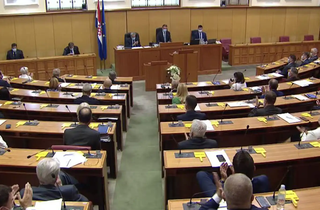In a vote held in the 151-seat National Assembly in the capital, Zagreb, the newly-formed government secured a vote of confidence with 79 "yes" votes and 61 "no" votes from members of parliament, with one abstention.
Plenkovic, who has been sworn in as prime minister, will lead the government for the next four years. This marks the Croatian Democratic Union's third consecutive victory in the general elections, having previously won in 2016 and 2020.
In the April 17 elections, HDZ emerged victorious, securing 61 deputies in parliament. The "Rivers of Justice" Alliance, composed of the Social Democratic Party (SDP), the Center Party, the People's Party-Reformists, the Civic-Liberal Alliance (GLAS), the Croatian Peasant Party (HSS), and the Party with the Name and Surname (SSIP), followed with 42 seats.
The "Homeland Movement" Alliance entered the National Assembly with 14 members, while the "Bridge and Partners" Alliance secured 11 seats. The "We Can" Alliance obtained 10 seats, the Istrian Democratic Party (IDS) and the Independent Northern Platform each gained two seats, and the Focus-Republic Alliance had one member in parliament. Additionally, there are eight members of minority parties in the National Assembly.
Prime Minister Andrej Plenkovic, who will lead the government through its next term, has committed to continuing the policies and strategies that have brought HDZ success in previous terms. As the party consolidates its position in Croatian politics, Plenkovic's leadership will be crucial in navigating both domestic and international challenges facing Croatia.
The HDZ's continued dominance in Croatian politics highlights the electorate's confidence in the party's vision and governance. As the new government takes charge, the focus will be on delivering on campaign promises and ensuring stability and progress for the nation. (ILKHA)



 Güncel
Güncel
 Güncel
Güncel
 Güncel
Güncel
 Güncel
Güncel
 Güncel
Güncel
 Dünya
Dünya
 Güncel
Güncel
 Dünya
Dünya
 Güncel
Güncel
 Güncel
Güncel





